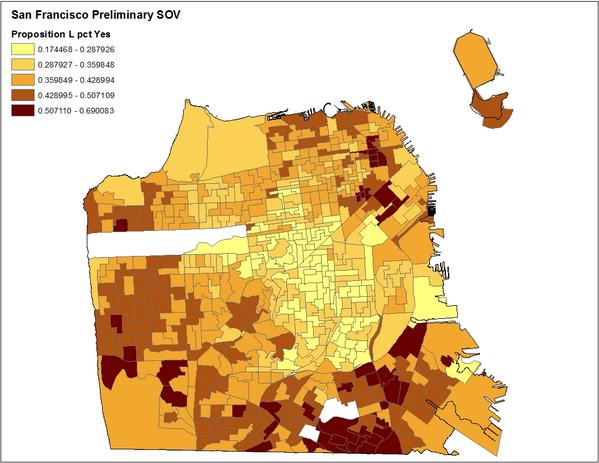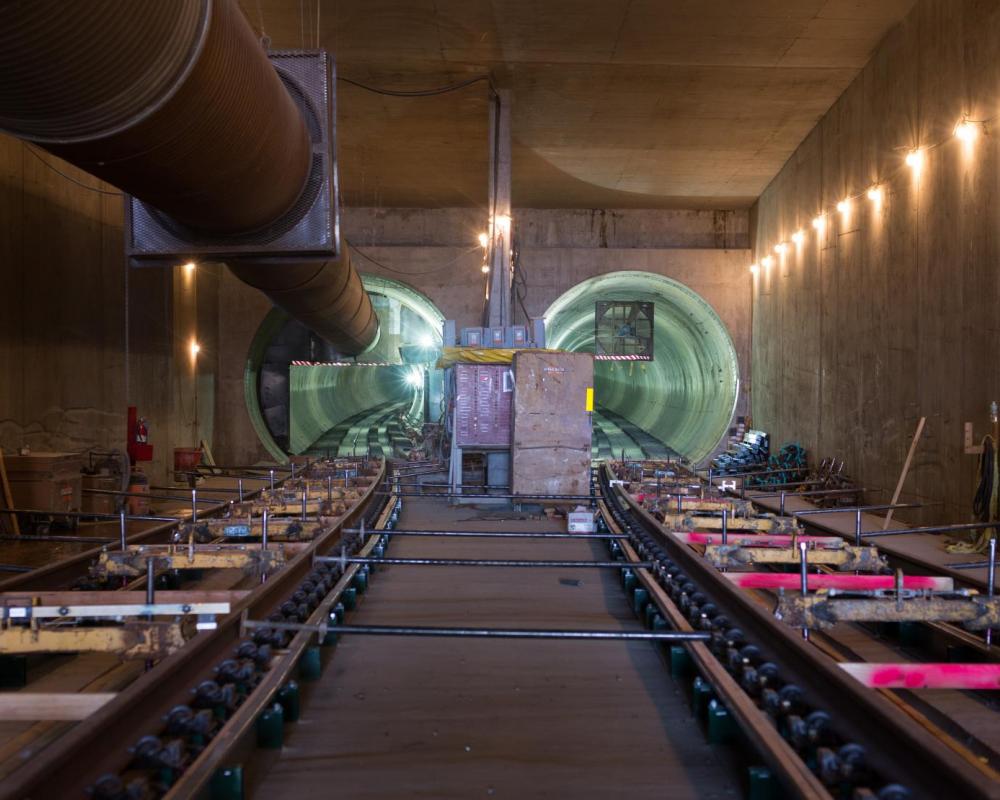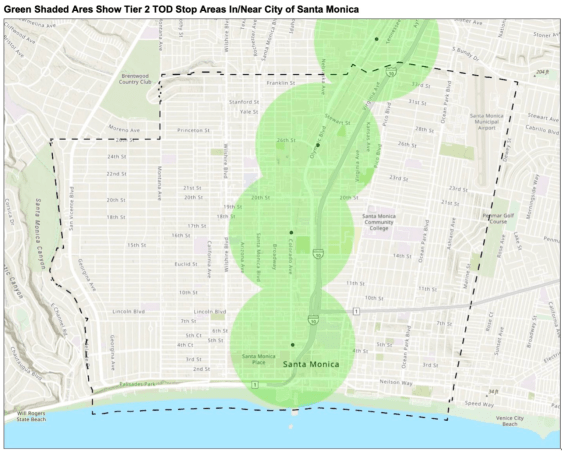
Proposition L was nixed by San Francisco voters yesterday. With nearly all of the votes counted, 62 percent rejected Sean Parker's measure to keep SF in the 20th century by prioritizing free parking and encouraging driving.
Leaders at City Hall, and the agencies that shape SF's streets, should read the writing on the wall: San Franciscans want to put the era of automobile-centric streets behind them, and it's time to stop letting a vocal minority of curmudgeons hamper efforts to make streets safer and Muni more reliable.
"The voters gave a pretty resounding 'yes,' we do want these things built," said Peter Lauterborn, who managed the "No on L" campaign. "I hope that the city leadership takes that to heart."
"Hopefully, for projects that we've set out to do -- Vision Zero, the [Transit Effectiveness Project] implementation, establishing the bike network -- the SFMTA will be bolder than they have been in the past," said Livable City Executive Director Tom Radulovich.
Voters also overwhelmingly approved two transportation funding measures, Propositions A and B. That's a sign that San Franciscans have a strong appetite for better transportation options, and that they're willing to bank on city agencies like the SFMTA to deliver them.
The success of Prop A, a $500 million general obligation bond for transportation, was not surprising given the political boost it got from City Hall and specifically Mayor Ed Lee. Lee helped to raise over $1,100,000 for the Prop A campaign, despite no organized opposition.
Meanwhile, the more controversial Prop B garnered a surprising 61 percent of the vote, even though no campaign committee was organized nor was money raised to promote it. "The campaign was gathering an impressive list of endorsements," said Supervisor Scott Wiener, who authored the measure.
"The voters showed that they really do care about smart transportation policy and investment," said Wiener. "City Hall needs to match our own budget priorities with what the voters want."
Prop B mandates an increase in the share of the general fund spent on transit, walking, and biking, and ties future increases to population growth. It will apply retroactively for the past ten years, increasing transportation spending by an estimated $22 million in the next budget.
Wiener introduced Prop B as a backup measure to restore transportation funding that was effectively cut when Mayor Lee dropped his support for a vehicle license fee that would have raised $1 billion over 15 years. If the VLF measure is passed in 2016, as Lee currently promises, it can override Prop B. Still, the measure drew attacks from Mayor Lee and advocates for other social services, such as affordable housing, because it would require trade-offs in the 2015 budget without bringing new revenue. Mayor Lee and some supervisors also feared Prop B could sink support for Prop A.
"That didn't happen," said Radulovich. Prop B's success "means that transit funding is important to people, and that they think more money will result in more and better transit."
As for criticisms about Prop B taking money from other social services, Radulovich said, "Transit is a social service. There seemed to be a false dichotomy."
Prop L's sound rejection reaffirms San Franciscans' support for the Transit-First Policy, which was adopted by the Board of Supervisors in 1973. In 1999, voters expanded the policy to also give priority for pedestrians and bicyclists over private automobiles, in the same election in which they voted to create the SFMTA.
The intent behind the Transit-First Policy, as mandated by the City Charter, was to undo decades of urban planning and policy that promoted driving at the expense of public transit. A key provision of the policy reads, “Decisions regarding the use of limited public street and sidewalk space shall encourage the use of public rights of way by pedestrians, bicyclists, and public transit, and shall strive to reduce traffic and improve public health and safety.”
When it comes to implementing that mandate, SF's transportation planning agencies and elected leadership seem to have gained traction in recent years. Still, too often transit-first takes a back seat to those who insist on preserving all car parking. Prop L's rejection should be considered yet more concrete evidence that only a vocal minority is making such protests.
Prop L saw more voter support in outer neighborhoods that lack attractive options for transit, biking, and walking. That was evidenced in a map of election results posted on Twitter last night by Corey Cook, an associate professor of politics and at University of SF and director of the university's Leo T. McCarthy Center for Public Service and the Common Good.

The strongest support for Prop L came from precincts in Bayview, Visitacion Valley, Parkside, and the Outer Sunset and Richmond. Surprisingly, Prop L also saw a majority of support from the Tenderloin and Chinatown, the two neighborhoods with the city's lowest rates of car ownership.
One factor could have been Prop L's vague ballot language which only asked voters, "Shall it be City policy to change parking and transportation priorities?," without actually listing what those priorities are, or could be. The question was not at all informative for anyone who had never heard of the measure.
Citywide, San Franciscans overwhelmingly rejected Prop L by nearly two to one. The rejection is even more significant given that Prop L's backers -- mainly major donors like billionaire Sean Parker -- threw $115,700 at the campaign, dwarfing the $28,500 raised in opposition.
San Franciscans are clearly ready for true "transportation balance," which means turning back the tide of car-dominated streets -- not perpetuating it.
"Voters in San Francisco, whether or not they drive, understand that it's in everyone's interest to have strong alternatives to driving a car," said Wiener. "If you're a driver, your best friends are the 40 people on a Muni bus or in a bike lane, rather than 40 people in cars, blocking you from getting through an intersection."
Radulovich noted that the Republican Party's national victories in yesterday's election may not bode well for federal transit funding. "We're not going to see a lot of leadership from Washington on sustainable transportation, so places like San Francisco are going to have to lead," he said.





